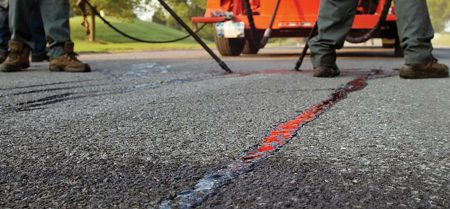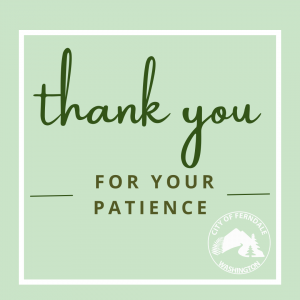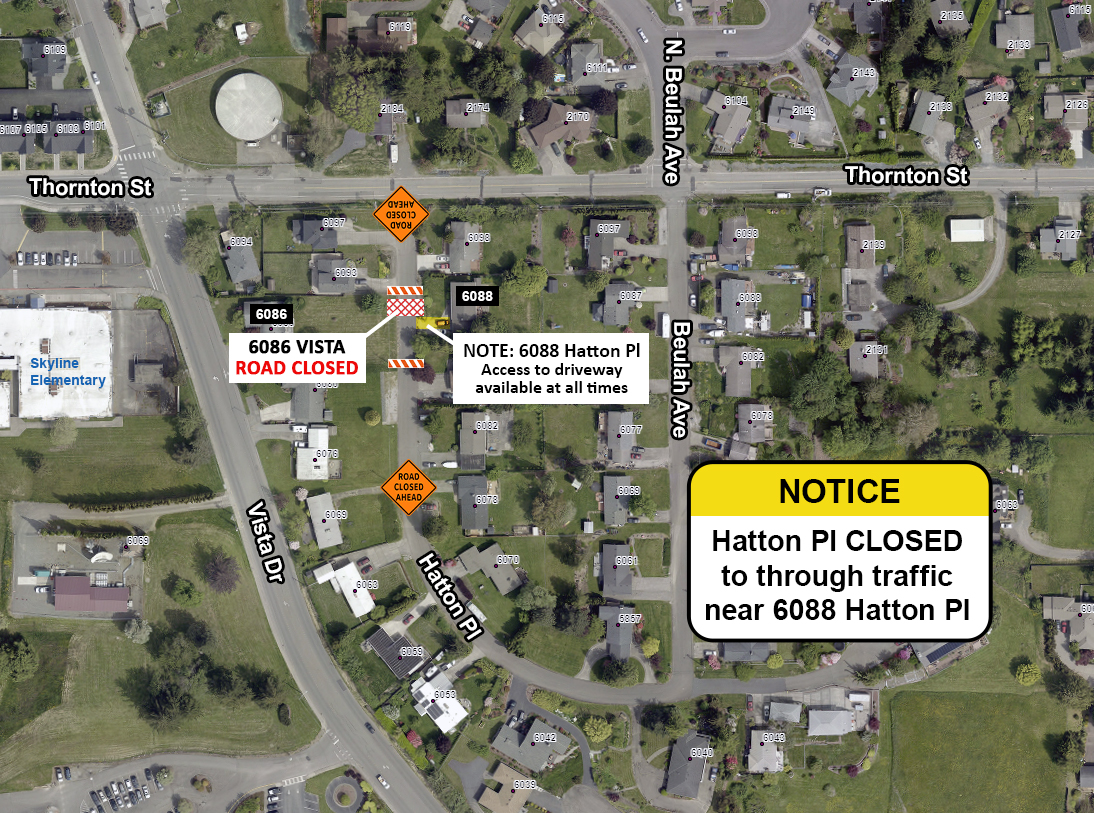The City of Ferndale and the Port of Bellingham are soliciting responses from qualified firms interested in providing professional infrastructure, engineering, economic, and feasibility study consulting services. We specifically are issuing a Request for Proposal (RFP) for qualified firms to work in partnership to conduct an analysis study on the extension of municipal sewer lines to Grandview business park area to determine the current and future benefits this project could have on the area and any anticipated challenges. For a more detailed scope of work, click here.
Background
Whatcom County lacks developable, serviced industrial and commercial land. The region further lacks land on which workforce housing can be built. Together, these factors place substantial risk to the region’s ability to grow, attract and retain businesses as well as a qualified workforce.
The current demand for both developable land and workforce housing is unprecedented. Whatcom County’s high quality of life, educated and skilled workforce, and the close proximity to the Lower Mainland of British Columbia have primed the region for growth.
The Grandview Road area, with land in the City of Ferndale (approximately 250 acres), and the City’s unincorporated Urban Growth Area (UGA, approximately 390 acres), is the last undeveloped freeway interchange within a city or UGA north of Seattle. The land is within ten miles of the Canadian border, and in close proximity to the BNSF railway line. Malloy Avenue lies immediately south of this area, and includes an additional 160 acres of largely undeveloped commercial and industrial land within the Ferndale City limits. West of Malloy Avenue is the majority of the City’s residential UGA, including nearly 500 acres that will support much of Ferndale’s future residential growth.
None of these areas are serviced by City sewer, and as a result will remain in an undeveloped or under-developed state until sewer services are extended.
The Project
The City of Ferndale proposes extending municipal sewer north along Malloy Avenue and then north along Portal Way to Grandview Road, at which point the City will cross Interstate Five in order to provide sewer services to the east side of the freeway (see attached conceptual alignment). In total, the sewer extension, which may be split into multiple phases, will extend nearly 2.5 miles. The City of Ferndale projects the total cost of the project will be approximately $15 million.
The goal of this project will be to analyze the economic impacts of this infrastructure extension, and how this infrastructure project may promote further economic investment either public or private development within the Grandview area. This analysis will also seek to evaluate, if there are other environmental, regulatory, or infrastructure challenges that may further delay or reduce development of the area. Finally, the analysis is to include recommended strategies, goals, potential future infrastructure projects, potential funding sources and planning-level costs to address any deficiencies that may be identified, so the final report among other purposes serving as a basis for future land use decisions and to support the development of the City’s 2025 Comprehensive Plan update, as it relates to this area.
Anticipated Timeline
This project includes creating an economic study, including a product market analysis of the economic, market strategies, public facilities, and land available. The City and Port anticipate the following schedule for this project:
| Milestones |
| Task |
Task Dates |
| RFP Responses Due by Noon |
May 31, 2024 |
| Selection of consultant by Port and Ferndale by |
June 7, 2024 |
| Scope, Fee and Negotiations |
June 14, 2024 |
| Contract completed by |
June 21, 2024 |
| PSA Approved by City Council |
July 1, 2024 |
| Contract work begins on |
July 8, 2024 |
| Detailed Project Management Plan Due |
July 11, 2024 |
Selection Criteria
Responses to this RFP will be evaluated based on how consultants are scored on their submitted responses to the RFP criteria and the interview process. A selection committee comprised of the Port of Bellingham Project Manager, City of Ferndale City Administrator, and the City Public Works Director will complete the evaluation process.
The Port of Bellingham and the City of Ferndale will evaluate and score the submitted proposals based on the selected criteria and point system shown below. The consultant’s required proposal and score will determine which consultant will be selected for the interview stage. During the interview, respondents will be given the opportunity to discuss their proposal, qualifications, and past experience in more detail. Following interviews and selection of a proposal the City of Ferndale and the selected respondent will negotiate a Professional Service Agreement (PSA). A respondent will be selected on qualification only as illustrated through their proposal and interview.
Required Responses based on the following criteria:
Qualifications and Experience of the Firm (50 points possible)
Demonstrate (in the last three years) recent and relevant experience having conducted a feasibility study and in the following categories:
a. Feasibility Study: Conducting comprehensive studies to analyze the technical economic, environmental, and social aspects of infrastructure projects for commercial and residential land use projects to determine their viability in both the near and long-term.
b. Project Management: Understanding project management principles and methodologies to effectively plan, execute, and monitor infrastructure projects from inception to completion.
c. Stakeholder Management: Engaging with various stakeholders, including government agencies, investors, community groups, and industry partners, to gather input and address concerns.
d. Technical Knowledge: Understanding the technical aspects of infrastructure projects, including engineering principles, construction methods, materials, and technology applications.
e. Economic Analysis: Demonstrate experience having done economic analyses. Assessing the financial feasibility of infrastructure projects, including cost estimation, revenue potential, return on investment, and financial risk analyses.
f. Market Research: Conducting market studies to understand demand, competition, and market trends that may determine the volume and nature of private development that may follow the successful extension of sewer and future infrastructure to the Grandview area
g. Regulatory Compliance: Understanding the legal and regulatory requirements governing infrastructure projects, including zoning laws, environmental regulations such as SEPA and NEPA, safety standards, and permitting process.
h. Communication Skills: Effectively communicating the findings and recommendations of feasibility assessments to stakeholders, decision-makers, and the public through clear and concise reports, presentations, and consultations.
i. Strategic Planning: Developing a strategic plan to address challenges and opportunities resulting from the feasibility analysis, including but not limited to identifying appropriate land use regulations (zoning and development standards), infrastructure needs, cost recoupment, communications, and environmental strategies that may lead to a larger return on investment and effective private development of the benefit area.
Clarity and effectiveness of the proposed methodology (40 possible points):
a. Project Plan: Detailed narrative of the project plan approach.
b. Timeline: Detail timeline of tasks to be completed the project.
c. Tasks and Goals: List of how the specific tasks and subtasks will be accomplished fulfilling goals, objectives, and scope of work.
d. Approach to data collection: quantitative and qualitative data to identify trends, patterns, and insight relevant to the infrastructure planning and development
e. Approach to quantitative analysis: Proficiency in using mathematical and statistical techniques to quantify and assessment different aspects of the project, such as cons-benefit analysis, risk assessment and performance evaluation.
f. Approach to qualitative analysis: Ability to conduct qualitative research methods
g. GIS and Spatial Analysis: Experience/Familiarity with Geographic Information (GIS) software and spatial analysis techniques to visualize and analyses spatial data relevant to infrastructure planning, such as land use, transportation networks, and environmental features or similar technology.
h. Documentation Method: Explanation of how documents and files are stored and shared for the project from concept to completion.
i. Final Recommendations: Approach to identifying goals, recommendations, and metrics of success, including the conceptual format of final reports, including the use of graphics and other illustrations that may aid in conveying technical information to stakeholders at all levels of understanding (elected officials, property owners, other agencies).
j. Project Management: Approach to coordinating with Port, City, partners and community members. Methodologies to plan, organize, and execute the study and project efficiently with time and budget.
k. Proposed project team: Identify the project team roles, and responsibilities for the project.
Other desired qualities:
Critical Thinking: capability to critically evaluate different approaches, methodologies, and assumptions used in infrastructure studies and make informed decisions based on evidence and logic.
Interdisciplinary Knowledge: Understanding the various disciplines relevant to infrastructure development, including engineering, economics, environmental science, sociology, and public policy.
Scenario Planning: Capability to develop and evaluate alternative scenarios for infrastructure development, considering different future conditions, uncertainties, and stakeholder preferences.
Communications: Experience effectively communicating complex topics to stakeholders at multiple levels of understanding and responsibility. In addition, being able to communicate to stakeholders, such as the City and the Port the importance of the need for additional requirements and responsibilities such as maintenance and operations as a result of successful project in the Grandview area.
References and Availability (10 points possible):
a. Provide contact information for clients and other professional references for similar projects.
b. Provide the consultant team has the ability to complete the project within the timeframe described, herein. Provide brief resume/work experience of the team.
Submittal Instructions:
Email materials to:
Susan Duncan, Administrative Services Director: susanduncan@cityofferndale.org
Please address any questions to Susan Duncan at the above email address.








